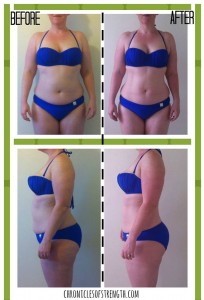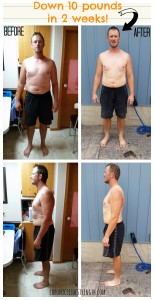Don’t think that a diet has to be miserable to work. Many of my clients enjoy the nutrition I give them, and stick to it long after the goals are reached and our work is done. Eating should be pleasurable and not a nuisance, even on a diet.
Most of what I do with private clients, when they come to me seeking faster fat loss, or whatever, is not start with a highly restrictive diet, but rather a simple series of nutritional manipulations, like micro-fasting, timing nutrients, targeting carbohydrate intake, and ordering food. When I say ordering food I mean eating food in a particular sequence, starting with fibrous crucifers, moving through meats and fowls and fats, and finishing with starches. Fill up on fiber first, and save the stuff that’s easy to overdo—like fruit and potatoes—for last.
I work to help them find balance, eliminating foods that don’t need to be there and bringing in a few that do. I can be both rigid and flexible—that depends on the goals of the client. But as a whole I want them to feel comfortable and confident in the nutritional outfit I tailor up for them, and feel that they could wear it to any occasion and for a very long time.
I should pause now, before going any further, and give two quick mentions.
Kate, a recent client of mine, has been following manipulations similar to what I’ve outlined above, with the exception of her using controlled-fasting rather than micro-fasting. She is down nearly nine pounds, steadily losing a reasonable 1-3lbs a week, which is the kind of progress I should very much like to see in a client and that is sustainable.
A little more aggressive example is TIM, who recently ran through the 14-day fat furnace, and dropped 10lbs.
The two of them were successful not by counting calories or anything so dull and tedious as that, but by manipulating other variables often overlooked or sneered at—when to eat (food timing), what to eat, and what to eat first.
When to eat is largely a matter of deciding on the first meal, which I typically like to procrastinate on. Micro-fasting is a place to start, if you want to try skipping breakfast. This prolongs the fasting period from overnight and burns fat without chaining you to the lamentable business of counting calories.
Keep carbs around 100 grams daily, eating most of them post workout. Don’t eat sugar. Fruit is fine, but you are better off with vegetables. I have a saying that the best ab exercise is broccoli.
Now nobody would argue—certainly not I—that a calorie isn’t important, and much of the weight loss process reduces itself to the fundamental law(s) of thermogenesis. But some of it doesn’t. Hormones shouldn’t be overlooked; hormones that are directly influenced by what you eat, how much, and when.
These things shouldn’t be sniggered at, as they sometimes are. Science is important, and I hold a high respect for properly conducted scientific investigations—which this industry is eternally lacking—but every now and then we have to find courage enough to venture into the unknown, where fresh ideas commonly lurk.
– Pat
Workout of the Week
PS – If you’d like a written out program to help you optimize your hormones, so you can regain metabolic flexibility, switch efficiently between energy sources, and burn more fat throughout the day, here’s a “backdoor” way to get my Complete Guide to Hormone Optimization at a discount.
The Complete Guide to Hormone Optimization is a simple, straightforward, and written out nutrition and exercise program designed to help optimize the interplay of your hormones (insulin, leptin, growth hormone, etc, etc) so you can switch your body into a metabolic state that is more conducive to burning fat and building strength and muscle.
This is achieved largely through nutritional manipulations, like some of those I talked about above, fasting, and some supplements (I don’t sell supplements, or have any vested interest in any supplement company–so my recommendations are wholly unbiased). It’s also achieved through a vigorous and concise metabolic strength training program, which will teach you to do the LEAST amount of work you need to do to get the job done so you can balance cortisol levels, recover quickly, and make continuos forward progress.
If this sounds like something you’d be interested in, I’m giving it away to all Inner Circle members this month. This is a $37 value.
1. To get it, CLICK HERE and join the Inner Circle ($20/month, cancel anytime)
2. After that, email me at PatFlynn@ChroniclesOfStrength.com with the subject line of “Hormone Op” and I’ll send it your way.




Pat, could you give us a sample of what a day of eating for you looks like? Great post and thanks for all you do.
What do you think about carb backloading? I usually workout in the am and will have some non starchy carbs but usually save my bigger meal (with starchy carbs) for night. Good idea?
I do like this approach, for some clients. The best measure of progress, however, is progress. Are you making the gains you want to be making? If so, then it’s a good idea. If not, then it’s time to re-evaluate your approach. Nutrition must be individualized for best results–but as a general rule, I think carb back loading can fetch some pretty good results.
I have noticed muscle growth and strength but I still struggle with losing some body fat. It is minor but still stubborn and feels as though my fat loss has stalled.
I like the idea of when to eat. I found that if I eat my dinner after 8 pm, I will tend to sleep much later then I will have less sleep hours. I usually eat my breakfast between 6 – 7 am, have snack around between 9 – 10 am, lunch at between 11 am – 12 pm, another snack between 2 – 3 pm and 5 – 6 pm (usually just tea at late afternoon). Dinner is unfortunately not at regular time. Either we eat between 6:30 – 7:30 pm or much later between 8:30 – 9:30 pm. If I eat dinner early, I will wake up so hungry and weak on next day and tend to get lazier to do morning workout. If I eat dinner at later time and if I sleep at 10 pm, I wake up feel better and enough energy to do morning workout even though I don’t take pre-workout snack. However, like I said earlier, eating much later makes me sleep much later, usually after 11:30 pm then as I have to wake up between 4:30 – 5 am, I will feel sleep deprived.
Can you give me any advice on my eating time schedule?